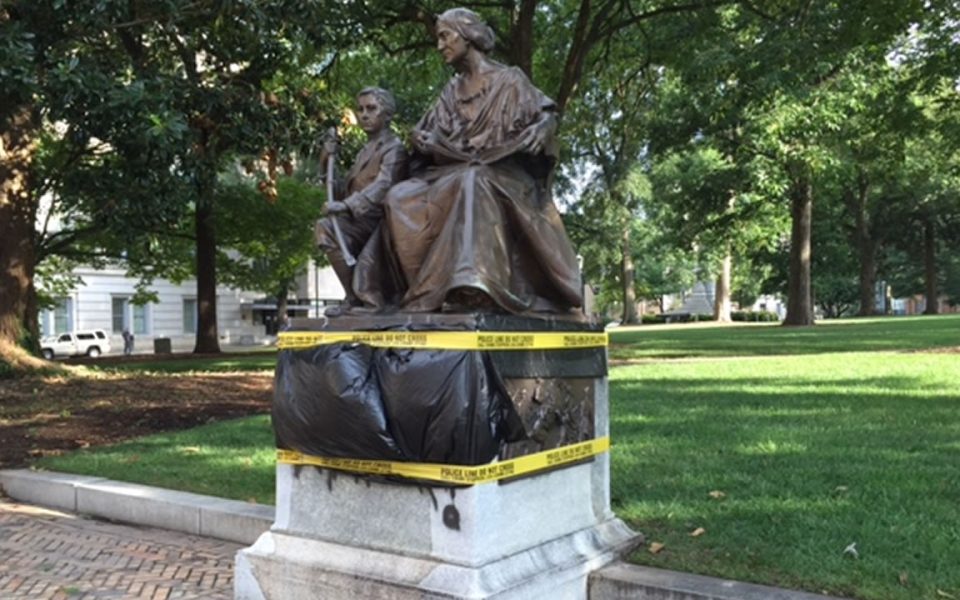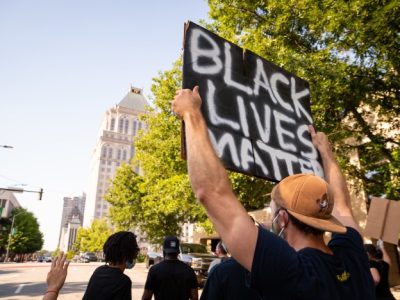North Carolina has an important reckoning this spring as to whether it will relocate three Confederate monuments from the State Capitol grounds in Raleigh to the Bentonville Battlefield, a Civil War landmark in Johnston County.
The lingering public mortification surrounding the bloody events of Charlottesville, where white supremacists gathered to defend Confederate statues and then visited mayhem and murder on the city, likely affords North Carolina a rare opportunity to take down its monuments to white terror with minimal opposition. But don’t count on the state to make a clean break; the resolution of the matter is likely to be messy and fraught with racial division.
The Confederate Monuments Study Committee, a subcommittee of the NC Historical Commission, conferred by phone on Monday. David Ruffin, a banker who chairs the study committee, told his fellow members: “I remind you that our charge is rather daunting, and that is to formulate our recommendations by the end of April.”The five committee members, who were appointed to the Historical Commission by Gov. Roy Cooper and his predecessor, Gov. Pat McCrory, also voted unanimously to hold at least one public hearing.
A bitterly polarized political shouting match is almost preordained by the uncertainty surrounding the study committee’s authority and the habit of the Republican leadership in the General Assembly to impose their will on political adversaries instead of delegating power.It’s not even clear that the study committee can take any action: Through his department of administration, Gov. Cooper proposed that the three monuments be removed to the Bentonville Battlefield. The Historical Commission, in turn, voted to establish the study committee to solicit opinions from the NC Department of Justice, the Institute of Government and six separate law schools on what actions the commission may take, including relocation or reinterpretation of the statues. The study committee will also review documentation assembled by staff that speaks to “the prominence, honor, visibility, availability, and access of both sites, Capitol Square and the Bentonville Battlefield.” The charge may seem arcane, but it’s important because a 2015 law signed by Gov. McCrory holds that “an object of remembrance that is permanently relocated shall be relocated to a site of similar prominence, honor, visibility, availability and access….”
Members of the study committee and staff expressed skepticism as to whether they’ll be able to work through their tasks in time to meet their April deadline.
Three members of the study committee have already tipped their hands, although their personal feelings about removal of the Confederate monuments may well be irrelevant.
Ruffin, who is the descendant of a Confederate soldier, told NC Policy Watch’s Joe Killian that he concluded that the monuments need to be removed last summer.
“Charlottesville was so toxic, it really changed my mind about some of these things,” Ruffin, the banker, said. “History and politics aren’t my profession — in fact, getting into some of this can be harmful in my profession. But you do know what is right and wrong. In this case, this is a runaway train. There’s no choice. You have to pick your battles — but in this case, you have to take a stand.”
Valerie Johnson, a study committee member who directs the Africana women’s studies program at Bennett College in Greensboro, likewise told Killian that she favors removing the statues.
“As a scholar and anthropologist by training, I can’t help when looking at these statues but be reminded that these are statues memorializing oppression and suppression,” Johnson said. “They were erected when Jim and Jane Crow were ramping up, to remind people of the superiority of whites.”
Chris Fonvielle, an associate professor of history at UNC-Wilmington, opposes removal. Fonvielle told Killian removing the statues “would be denying opportunities for teaching and learning about the South’s complex, troubled, and sometimes dark past.”
Noah Reynolds, a Winston-Salem venture capitalist and trustee for the Z. Smith Reynolds Foundation, and Sam Dixon, a lawyer in Edenton, also serve on the study committee.
By law, the state cannot remove, relocate or alter any monument without the approval of the NC Historical Commission, but the Republican leadership in the General Assembly has already short-circuited the process.
House Speaker Tim Moore and dozens of other lawmakers signed on to a memo clarifying, as Killian paraphrased, that “the provision in the 2015 law allowing for movement of the monuments was intended only to protect them from things like harsh weather or construction that might damage them. Public protests — even ones that might lead to the statues being pulled down as the Confederate monument was in Durham over the summer — were not to be considered.”
Killian also wrote that the House lawmakers objected to moving the monuments to the Bentonville Battlefield on the grounds that it would not be a site of “similar prominence,” and Senate President Pro Tem Phil Berger asked Cooper to withdraw his request, calling it “insincere.”
Whether the Republican lawmakers genuinely care about preserving symbols of white supremacy isn’t clear. But it’s a good bet they’re happy to exploit a polarizing issue guaranteed to rile up their base in an election year.
Join the First Amendment Society, a membership that goes directly to funding TCB‘s newsroom.
We believe that reporting can save the world.
The TCB First Amendment Society recognizes the vital role of a free, unfettered press with a bundling of local experiences designed to build community, and unique engagements with our newsroom that will help you understand, and shape, local journalism’s critical role in uplifting the people in our cities.
All revenue goes directly into the newsroom as reporters’ salaries and freelance commissions.





Leave a Reply